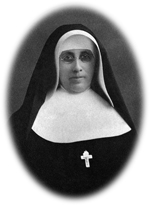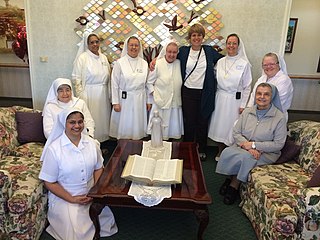Related Research Articles

Mary Frances Xavier Warde R.S.M. (1810-1884) was one of the original Sisters of Mercy, a Roman Catholic religious congregation of women founded in Ireland by Catherine McAuley, and the foundress of the order in the United States.

Mary Alfred Moes, was a Roman Catholic nun who was instrumental in establishing first the Sisters of St. Francis of Mary Immaculate in Joliet, Illinois, as well as the Sisters of Saint Francis of Rochester, Minnesota. She was also the founder of St. Mary's Hospital, Rochester, Minnesota, which became part of the famed Mayo Clinic. Moes had been given a vision from God of a great hospital rising out of the cornfields around Rochester–the little country town, with its one doctor. To that hospital, she had been told in her vision, would come patients from every part of the world and from every nation. And she had seen the name ‘Mayo’ respected the world over for surgical achievements.
Sisters of St. Francis may refer to:
The Franciscan Sisters of Mary is a Roman Catholic religious congregation of religious sisters based in St. Louis, Missouri, noted for its operation of SSM Health Care, a group of some 20 hospitals throughout the Midwestern United States. It was formed in 1987 from the merger of two related congregations that founded many of the hospitals.
The Third Order of Saint Francis is a third order in the Franciscan tradition of Christianity, founded by the medieval Italian Catholic friar Francis of Assisi.
Mary Odilia Berger, S.S.M. was a German-born Catholic religious sister who founded the Sisters of St. Mary in 1872 in St. Louis, Missouri. The order established and still runs hospitals throughout the Midwestern United States. In 1987 they merged with Sisters of St. Francis of Maryville, another congregation which had branched off from them, and together became the Franciscan Sisters of Mary.

Mary Frances Schervier, TOSF was a German Catholic nun who founded two congregations of religious sisters of the Third Order Regular of St. Francis, both committed to serving the neediest of the poor. One, the Poor Sisters of St. Francis, is based in her native Germany, and the other, the Franciscan Sisters of the Poor, was later formed from its province in the United States.
The Franciscan Sisters of the Poor are a religious congregation which was established in 1959 as an independent branch from the Congregation of the Poor Sisters of St. Francis, founded in Germany by Blessed Frances Schervier in 1845.
The Poor Brothers of the Seraphic St. Francis, abbreviated C.F.P. are a Catholic lay religious congregation of Pontifical Right for men of the Third Order Regular of St. Francis, instituted for charitable work among orphan boys and for youth education. They commonly also use the title of Brothers of the Poor of St. Francis.
The Sisters of the Poor Child Jesus is a Roman Catholic religious congregation for women, founded at Aachen, Germany, in 1844 for the support and education of poor, orphan, and destitute children, especially girls. It was approved by Pope Pius IX in 1862 and 1869, and by Pope Leo XIII in 1881 and 1888. They also founded a school in Barnet, London, called St Michael's Catholic Grammar School.
The Franciscan Sisters of the Sacred Heart is a Roman Catholic religious congregation of women based in Frankfort, Illinois, and located in the Catholic Diocese of Joliet, Illinois. The Sisters serve in healthcare, education, religious education, parish and diocesan ministries and ministry to the poor.
The Franciscan Brothers of the Holy Cross are a congregation of Religious Brothers of the Franciscan Third Order Regular who were founded by Brother James Wirth in Hausen, Germany, on 12 June 1862. They were founded to answer a call to care for orphans, the poor, the sick and the suffering.
The Poor Franciscan Sisters of the Holy Family are a congregation of religious sisters of the Franciscan Third Order Regular. They were founded in Pirmasens, Germany, in 1855 by the Blessed Paul Joseph Nardini. They are therefore commonly known as the Nardini Sisters, or the Mallersdorfer Sisters from the German town where they are headquartered.
The Sisters of the Sorrowful Mother are a Catholic congregation of Franciscan religious sisters founded in Rome, Italy, in 1883, who serve worldwide, particularly in the field of healthcare.

The Franciscan Hospitaller Sisters of the Immaculate Conception are members of a Roman Catholic religious institute of consecrated women, which was founded in Portugal in 1871. They follow the Rule of the Third Order Regular of St. Francis. and, as the term “hospitaller” indicates, focus their ministries on a spirit of medical care. Their charism emphasizes hospitality and service under the model of the Good Samaritan. In this congregation, the postnominal initials used after each sister's name is "F.H.I.C."

Maria Hueber was a Tyrolean religious sister, a pioneer in educating girls in and foundress of a congregation of the Third Order of Saint Francis in Brixen.
The Sisters of St. Francis of the Neumann Communities was formed in 2004 with the union of three separate congregations: Sisters of St Francis of Syracuse, Sisters of St. Francis of the Mission of the Immaculate Virgin, and the Sisters of St. Francis Third Order Regular of Buffalo. During the process of the reorganization, the Franciscan Missionary Sisters of the Divine Child merged with the Williamsville Franciscans in 2003. The Sisters of St. Francis of Millvale merged with the congregation in 2007.
References
- ↑ "Startseite". Armen-Schwestern vom heiligen Franziskus (in German). Retrieved 3 January 2013.
- ↑ "Erkennungszeichen: Das rote Kreuz". Armen-Schwestern vom heiligen Franziskus (in German). Retrieved 3 January 2013.
- ↑ "Blessed Frances Schervier". Franciscan Sisters of the Poor. Archived from the original on 20 May 2013. Retrieved 3 January 2013.
- 1 2 "Francis Schervier". Encyclopedia of 1848 Revolutions. Retrieved 3 January 2013.
- 1 2 3 Antonia, S.P.S.F., Sister (1911). Sisters of the Poor of St. Francis. Vol. 12. New York: Robert Appleton Company. Retrieved 30 September 2015.
{{cite book}}:|work=ignored (help) - ↑ "Konvente". Armen-Schwestern vom heiligen Franziskus (in German). Retrieved 3 January 2013.
- ↑ "Schwester M. Martha Kruszynski übernimmt das Leitungsamt". Armen-Swchwestern vom Heiligen Franziskus (in German).